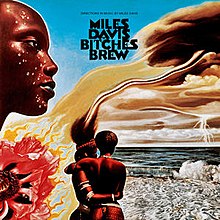Bitches Brew
| Bitches Brew | ||||
|---|---|---|---|---|
 |
||||
| Studio album by Miles Davis | ||||
| Released | March 30, 1970 | |||
| Recorded | August 19–21, 1969 | |||
| Studio | 30th Street Studio, New York | |||
| Genre | ||||
| Length | 94:11 | |||
| Label | Columbia | |||
| Producer | Teo Macero | |||
| Miles Davis chronology | ||||
|
||||
| Professional ratings | |
|---|---|
| Retrospective reviews | |
| Review scores | |
| Source | Rating |
| AllMusic | |
| Christgau's Record Guide | A− |
| Encyclopedia of Popular Music | |
| Entertainment Weekly | A |
| Mojo | |
| MusicHound Jazz | 5/5 |
| The Penguin Guide to Jazz | |
| Pitchfork | 9.5/10 |
| The Rolling Stone Album Guide | |
| Sputnikmusic | 5/5 |
Bitches Brew is a studio double album by American jazz musician Miles Davis, released on March 30, 1970, on Columbia Records. The album continued his experimentation with electric instruments previously featured on his critically acclaimed In a Silent Way album. With the use of these instruments, such as the electric piano and guitar, Davis rejected traditional jazz rhythms in favor of a looser, rock-influenced improvisational style. Upon release, it received a mixed response, due to the album's unconventional style and experimental sound, but became Davis's first gold record; it sold more than half a million copies.
In subsequent years, Bitches Brew gained recognition as one of jazz's greatest albums and a progenitor of the jazz rock genre, as well as a major influence on rock and funk musicians. The album won a Grammy Award for Best Large Jazz Ensemble Album in 1971. In 1998, Columbia Records released The Complete Bitches Brew Sessions, a four-disc box set that included the original album as well as the studio sessions through February 1970.
Recording sessions took place at Columbia's 30th Street Studio over the course of three days in August 1969. Davis called the musicians to the recording studio at very short notice. A few pieces on Bitches Brew were rehearsed before the recording sessions, but at other times the musicians had little or no idea what they were to record. Once in the recording studio, the players were typically given only a few instructions: a tempo count, a few chords or a hint of melody, and suggestions as to mood or tone. Davis liked to work this way; he thought it forced musicians to pay close attention to one another, to their own performances, or to Davis's cues, which could change at any moment. On the quieter moments of "Bitches Brew", for example, Davis's voice is audible, giving instructions to the musicians: snapping his fingers to indicate tempo, or, in his distinctive whisper, saying, "Keep it tight" or telling individuals when to solo.
...
Wikipedia
